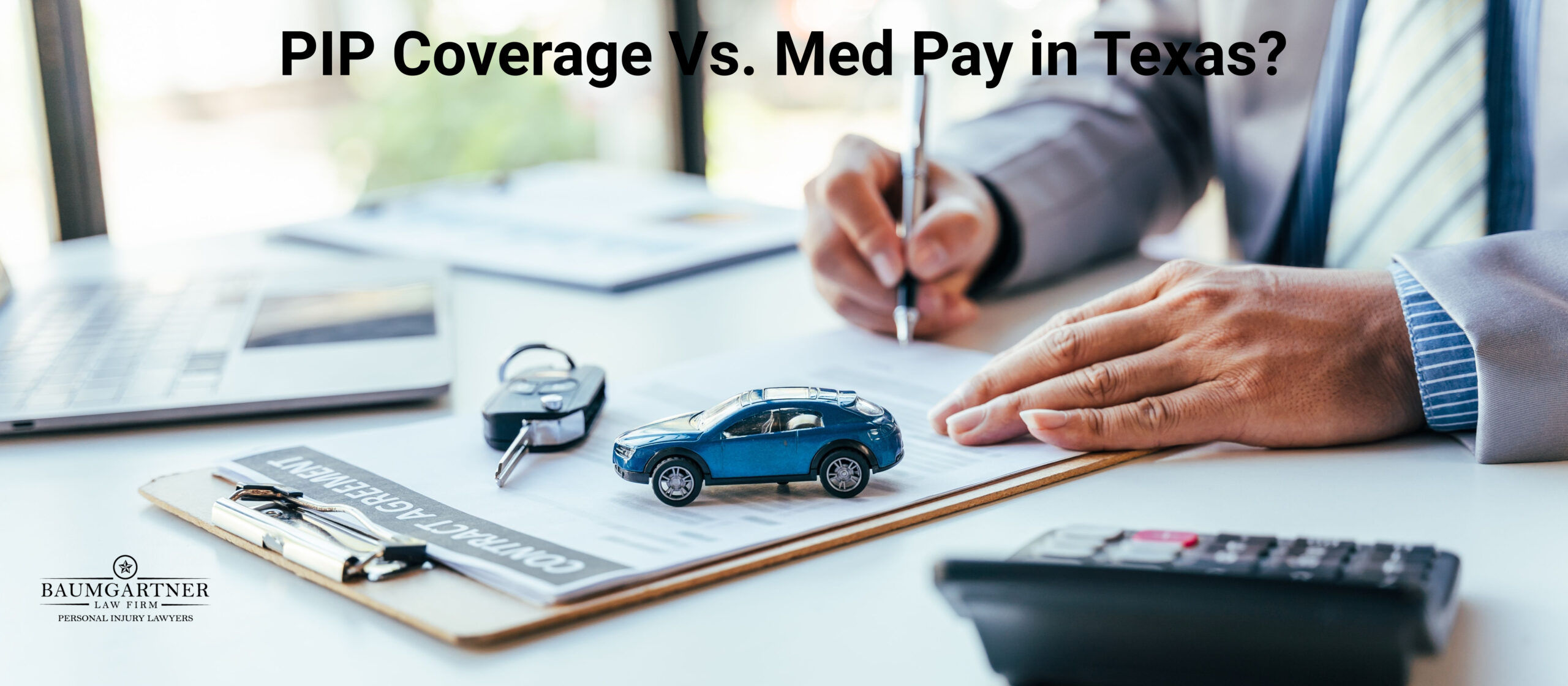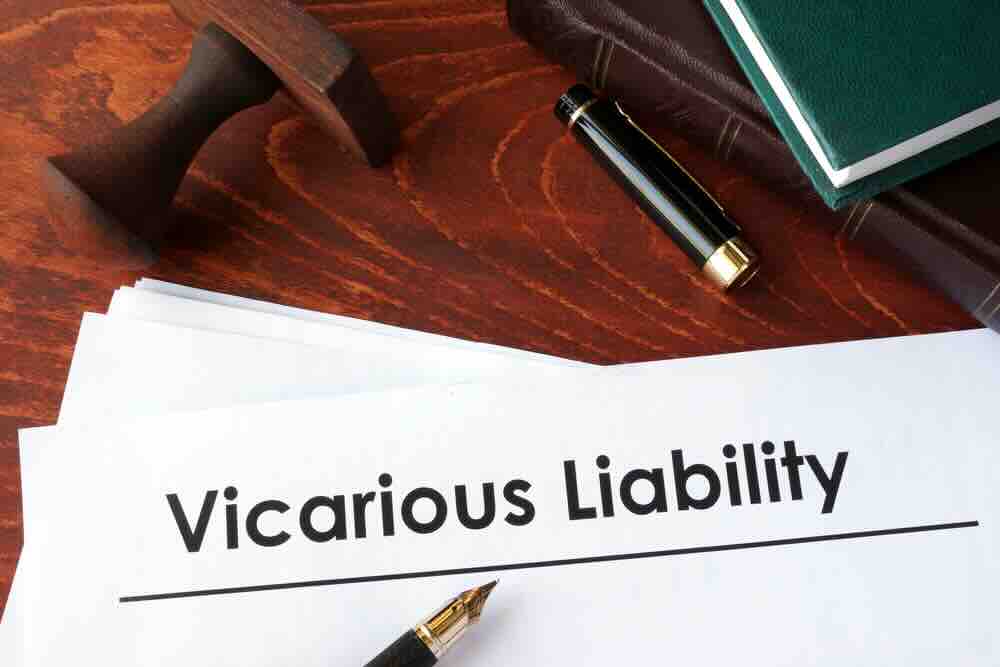Personal Injury Protection (PIP) coverage is one coverage that we recommend everyone carry on their auto insurance policy. While the minimum coverage is usually twenty-five hundred dollars ($2,500), we suggest that you carry at least $5-$10,000 in PIP coverage. When considering PIP vs. med pay in Texas, it’s essential to understand that Med Pay coverage is an optional benefit that insurance companies are not required to offer.
PIP or Med Pay- Which is Better?
We believe that PIP coverage offers better benefits to those hurt in an auto accident. Here is why.
What is PIP Coverage in Texas?
PIP, or “personal injury protection,” is a type of auto insurance coverage available in Texas that pays medical bills and lost wages after an accident, regardless of fault.
PIP comes in handy when the health insurance coverage you have refuses to pay because it’s a car accident claim, and they say someone else should pay. In effect, the health insurance company often tells their insureds–to go collect from the negligent driver but that doesn’t help someone with a bill collector calling and harassing them for their medical bills.
Many car wreck claims can take months to resolve, and sometimes even years. Leaving the medical bills unpaid does not sit well with many people. That’s where PIP comes to the rescue.
Additionally, if you are involved in an accident with a driver who does not have insurance, PIP or Med Pay can help cover your medical expenses. Or the other person thought that they had insurance, but you find out their insurance lapsed.
Med pay vs. PIP is not a close call. Get the PIP!
Many primary care physicians are also reluctant to treat car accident victims simply because they expect a health insurance company to deny the claim pending the resolution of a car accident lawsuit. Med Pay is similar to PIP but more limited and costs only slightly less.
Pip vs Med Pay– our car accident lawyer in Houston suggests getting the PIP even if it costs slightly more.
We Suggest PIP over Med Pay
Texas auto insurance varies in scope and substance from that of other states. The Texas Department of Insurance has valuable resources for learning about car insurance coverage in Texas. Here is an article about the differences between PIP and Med Pay.
What PIP Covers in Texas
PIP insurance pays for your medical expenses, lost wages, and other expenses if you are injured in an automobile accident. PIP will also cover the same costs for your passengers if a car crash hurts them. In Texas, Personal Injury Protection coverage is required unless you sign a waiver declining the coverage.
Specific Coverage for PIP in Texas
- Reasonable medical expenses
- Ambulance costs
- Physical therapy
- Funeral expenses
- Lost income because of the crash
- Replacement of family member services for an injury victim.
Personal Injury Protection coverage is very affordable and serves as a mechanism to help pay some of your medical expenses quickly. Our experience has shown that many health insurers are hesitant to pay medical claims for injuries from an accident, given the overreaching of some medical providers and the ongoing battle over “who pays.”
Nevertheless, Personal Injury Protection coverage is excellent insurance in the event of a severe car accident.
PIP is Paid Regardless of the Fault
PIP benefits are paid regardless of fault or the availability of other coverage or benefits. However, an offset can sometimes be applied when a liability claim is being made under the same policy as the PIP.
Recently, many insurance companies have misrepresented themselves as health insurance companies and are discounting payments to their insureds, citing that the expenses charged by healthcare providers were not “reasonable expenses.”
The validity of this approach depends upon the specific facts of the claim. If a medical provider insists on full payment, it seems unlikely that courts would require the insured to be on the hook for the unpaid bill that the insurer has “discounted.”
Who is Covered by PIP?
The statutory minimum personal injury protection coverage is $2500. However, the PIP coverage can be written in almost any amount should you desire additional coverage.
Personal injury protection covers everyone in the insured vehicle up to the PIP policy limits. PIP also covers every insured regardless of the vehicle they are in during an accident. PIP coverage is paid when there is a “motor vehicle accident” under the standard auto policy.
When to Claim PIP?
Payments under the PIP policy apply to covered losses that are incurred within three years of the accident date. Generally, the insurer must pay the claim within 30 days of receipt of the claim.
The best time to claim PIP benefits is as soon as you have your medical bills to submit to your auto insurance company.
Stacking of Policies Allowed
Case law indicates that in some instances, when there are two separate PIP policies, they can be stacked on top of each other to fully compensate for damages. This means that if you are covered by more than one policy, you may be able to collect under all of them.
Health Insurance Paid Bills are Still Eligible for PIP
Even if your health insurance paid your medical bills from a car accident, PIP might still apply to those same bills. At the same time, some auto insurers claim otherwise. When in doubt, contact an injury attorney.
Personal injury protection can be a very important part of your auto insurance coverage and can make a bad situation a little bit better if you carry the coverage.
We recommend that consumers in Texas carry personal injury protection if they can afford it, and that they carry personal injury protection instead of medical payments coverage.
Medical Pay Coverage
Medical Payments or Med Pay coverage.
Unlike PIP, Medical Payments (Med Pay) coverage is not mandatory in Texas. Your insurance company does not have to offer you Medical Payment coverage. Medical Payment coverage is more limited than PIP in Texas. The fundamental limitations of Med Pay are:
- Medical pay only pays expenses within one year of the crash
- there is no coverage for chiropractic treatment
- it only reimburses your health insurance deductibles and co-pays if you have health insurance
- It does not cover lost wages.
Med Pay and Subrogation or “Pay Back”
We recommend you obtain PIP coverage instead of “medical pay coverage” because the Med Pay coverage asks that you pay them back should you recover from the third party who caused the accident. This subrogation requirement makes PIP coverage a better option, in our opinion.
In effect, Med Pay coverage pays the bills initially and then gets reimbursed out of any personal injury settlement. If you have to pay your insurer back, there’s not a lot of value in merely fronting the money for the medical bills. Personal injury protection in Texas does not require paying back your medical expenses to the car insurance company.
Do You Need a Lawyer to Collect PIP or Med Pay in Texas?
No, you probably don’t need a car insurance attorney to collect PIP or Med Pay coverage. You may, however, want to consider consulting with an attorney if your injuries are more substantial than a typical whiplash-type case.
There can be issues such as subrogation, coordination of benefits, and whether or not your insurance carrier gets offset for PIP coverage paid when you are making an uninsured or UIM coverage claim.
Additionally, we have found that many insurance carriers are being obstructive and trying to claim undue offsets on many PIP applications. In such situations, you may need an attorney’s assistance.
Call Our Experienced Car Accident Lawyers with Questions
If you have been injured in a car accident in Harris County, Texas, and want to speak with a car accident lawyer, call our personal injury law firm in Houston for a no-obligation consultation.
6711 Cypress Creek Pkwy, Houston, TX, 77069
Call (281) 587-1111 for a free consultation!
You are never under any obligation with a free injury consultation!
If you liked this article, you may also like these:
- PIP Insurance in Texas
- What is a Letter of Protection in a Texas Personal Injury Case?
- Falls a Leading Cause of Death in Texas Construction Accidents
- Car Insurance Attorneys Near Me: Auto Insurance Claims Lawyer in Houston
- Dealing with the Insurance Company After an Auto Accident
Visit Our Law Firm in Houston













